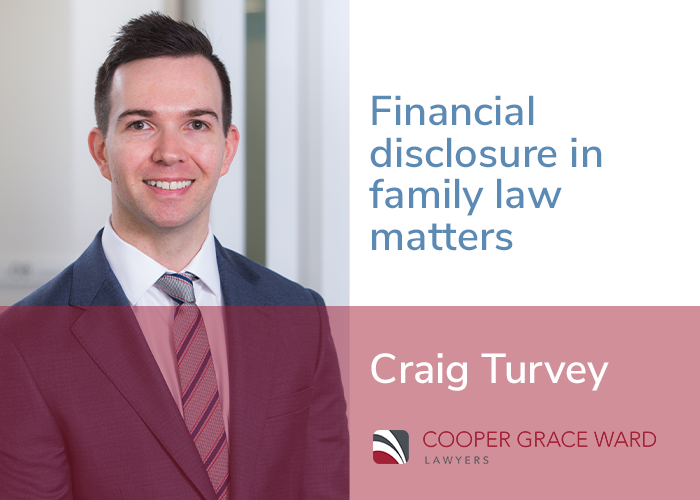Best Lawyers have released their rankings for Best Law Firms 2026 and Cooper Grace Ward has an impressive recognition in 21 practice areas. ...

In this video, senior associate Craig Turvey talks about your financial disclosure obligations under the new Federal Circuit and Family Court rules.
Hi, my name is Craig Turvey, and I’m a senior associate in the Family Law workgroup at Cooper Grace Ward. Today I’d like to talk to you about your financial disclosure obligations under the new Federal Circuit and Family Court rules.
Previously, people have always had disclosure obligations. There’s nothing new about that. The purpose of the new rules, though, is really to encourage disclosure at an early stage so that people can push their matter towards a resolution without needing to rush off to court, then getting disclosure orders, then clogging up the court process. So, there’s a big emphasis on disclosure at an early stage.
Parties’ disclosure obligations haven’t changed in the sense that the new rules don’t dictate a complete set of documents that you’re required to exchange. And that’s largely because everyone’s circumstances are different. Some people will have investments, they need to provide documents about those, some people will have more modest assets or a very simple type property pool and financial circumstances, so they don’t really need to provide the same complex level of disclosure that people with corporate interests might have.
Nevertheless though, you’re still obligated to provide a certain suite of documents as part of your disclosure obligations, either before you commence proceedings, or just in ordinary, just as part of your normal sort of practice. The usual documents, again, there’s no fixed set as to what these documents are, but the usual set of documents that people should exchange are; the last three tax returns and notices of assessment, twelve months of bank and credit card statements, if you have a superannuation interest in a self-managed super fund, then a trust deed of the fund and the last three set of financials, if you have a superannuation interest in an industry fund, then you should provide probably the most recent member balance statement, and as well, send the superannuation information form to the fund.
In addition to that, if you have any interest in a company, whether that’s because you’re a director, a shareholder, or you have some other particular interest, then you should provide a copy of the Constitution, any amendments to the Constitution and the last three set of full financials.
If you have an interest in a trust, whether that’s as the appointor or the trustee, a beneficiary or some other interest, then you should provide a copy of the trust deed, any amendments to the trust deed and the last three set of financials.
If you have any investments, then you should provide up-to-date statements of those. If you have properties, you’re supposed to provide any disclosure of all of those types of things.
Again, the new rules don’t set out specifically, document by document what interests you’re supposed to disclose the obligations on you as a party to the proceedings to provide all relevant documents. Sometimes people don’t like doing that. They might have, for example, a term deposit that they’ve held that might be an inheritance that they received before they married someone, or some particular type of investment or interest that they don’t necessarily want to disclose. You’re required to nevertheless disclose those things. And if you don’t, it means that any settlement deal that you have with your former spouse might be able to be set aside at a later stage if you don’t comply with your obligations.
So, the new rules don’t really change anything in terms of what people are expected to do, but there’s an increased emphasis on doing it at an early stage, and if you fail to either provide the relevant financial documents at an early stage or within a timely manner, it is possible that a court officer like the judicial registrar, at an early return date, will make a costs order against you, and it’s possible for them to make court orders against solicitors as well. So, there’s just an increased emphasis by the court on getting people to do those things at an early stage. So, rather than just kicking the can down the road and delaying the exchange of disclosure documents, you should do it at a really early stage.
If you have any questions about your financial disclosure obligations, please don’t hesitate to contact me or one of the other family lawyers at Cooper Grace Ward.
This publication is for information only and is not legal advice. You should obtain advice that is specific to your circumstances and not rely on this publication as legal advice. If there are any issues you would like us to advise you on arising from this publication, please let us know.
Subscribe to our interest lists to receive legal alerts, articles, event invitations and offers.

Cooper Grace Ward acknowledges and pays respect to the past, present and future Traditional Custodians and Elders of this nation and the continuation of cultural, spiritual and educational practices of Aboriginal and Torres Strait Islander peoples.
Fast, accurate and flexible entities including companies, self-managed superannuation funds and trusts.